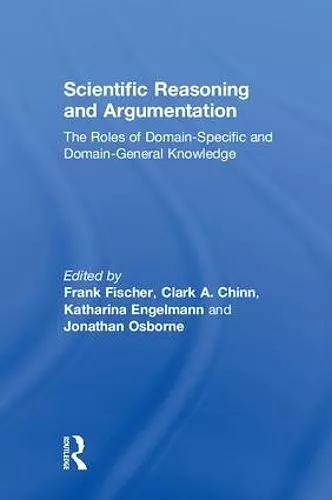Scientific Reasoning and Argumentation
The Roles of Domain-Specific and Domain-General Knowledge
Frank Fischer editor Jonathan Osborne editor Clark A Chinn editor Katharina Engelmann editor
Format:Hardback
Publisher:Taylor & Francis Ltd
Published:4th Jun '18
Currently unavailable, and unfortunately no date known when it will be back
This hardback is available in another edition too:
- Paperback£44.99(9781138302280)

Competence in scientific reasoning is one of the most valued outcomes of secondary and higher education. However, there is a need for a deeper understanding of and further research into the roles of domain-general and domain-specific knowledge in such reasoning. This book explores the functions and limitations of domain-general conceptions of reasoning and argumentation, the substantial differences that exist between the disciplines, and the role of domain-specific knowledge and epistemologies. Featuring chapters and commentaries by widely cited experts in the learning sciences, educational psychology, science education, history education, and cognitive science, Scientific Reasoning and Argumentation presents new perspectives on a decades-long debate about the role of domain-specific knowledge and its contribution to the development of more general reasoning abilities.
"This excellent book brings together internationally renowned leaders across multiple fields to explore a critical question at the heart of education in a post-factual world. Specifically, understanding the complex interrelationships of domain-specific and general knowledge in scientific reasoning and argumentation is central to conceptualizing and re-organizing our approaches to education. The theoretical and pragmatic implications explored in this book reshape and define research and design of learning and learning environments for the coming century."
—Douglas Clark, Werklund Professor of Design-Based Learning at the University of Calgary, Canada
"This book brings together experts in the field of scientific reasoning and argumentation to deconstruct a fundamental challenge facing our field: are there aspects of scientific reasoning and argumentation that are general in a way that enables their useful application across domains? Understanding the complexities of this vexation has implications for how we teach and evaluate our students as they learn with and about scientific reasoning and argumentation."
—Leema Berland, Associate Professor of Science Education at the University of Wisconsin at Madison, USA
"In this timely volume, psychologists, educational researchers, and argumentation scholars move beyond the old dispute between domain-specific and domain-general knowledge. A series of ingenious case studies and broader models shows how these two types of knowledge interact and complement each other in the way scientists think and exchange arguments with each other."
—Hugo Mercier, Research Scientist at the French National Center for Scientific Research and co-author of The Enigma of Reason
"In science education, we often slip into assuming that the argumentation and problem-solving skills we teach are general skills, smoothly transferable across academic and non-academic domains. This book’s excellent choice of contributors takes on that assumption with depth and nuance."
—Andrew Elby, Associate Professor at the University of Maryland–College Park, USA
"The thrust of the collection is an expansive discussion on the role of education psychology in intuitive and acquired scientific reasoning and argumentation, in subjects ranging from children to practicing scientists. The articles focus on how this understanding might be used to advance pedagogy in schools and colleges in all areas of learning—from mathematics and science to history and social studies. Each of the articles is accompanied by copious references. The volume overall is best suited to specialists in education psychology."
—N. Sadanand, Central Connecticut State University, CHOICE
ISBN: 9781138302266
Dimensions: unknown
Weight: 453g
290 pages